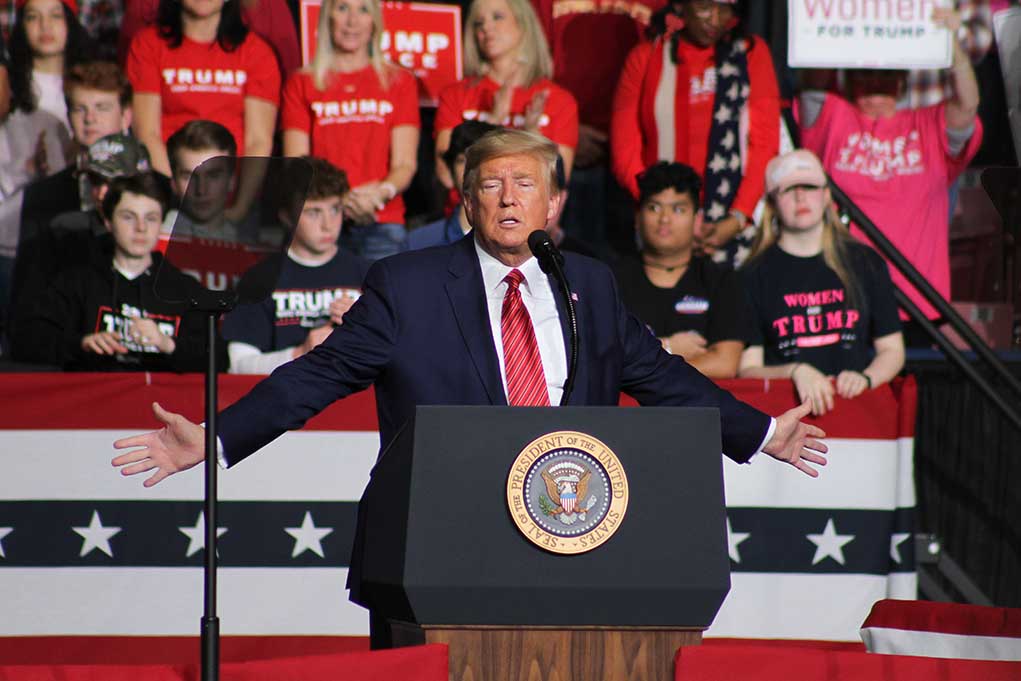
President Trump’s “big, beautiful bill” faces a major Senate overhaul as GOP divisions threaten the $3 trillion package’s passage before the looming debt ceiling deadline.
Key Takeaways
- President Trump has given Senate Republicans permission to significantly revise the House-passed tax and spending bill despite Speaker Johnson’s concerns
- The $3+ trillion bill narrowly passed the House and must be approved by July 4 to avoid a potential debt default in mid-July
- Senator Rand Paul and other conservatives criticize the bill for insufficient deficit reduction, calling proposed cuts “wimpy and anemic”
- Contentious areas include Medicaid and SNAP provisions, SALT deduction caps, and green energy tax breaks
- Speaker Johnson warns that significant Senate changes could jeopardize the bill’s passage when it returns to the House
Trump Allows Senate Republicans to Reshape Domestic Agenda Bill
President Donald Trump has granted Senate Republicans latitude to substantially revise his domestic policy package after its narrow passage in the House. Despite Speaker Mike Johnson’s appeals to maintain the delicate compromise that secured House approval, Trump expressed openness to Senate modifications. “I want the Senate and the senators to make the changes they want. It will go back to the House and we’ll see if we can get them. In some cases, the changes may be something I’d agree with, to be honest,” stated President Donald Trump, acknowledging the legislative reality facing his agenda.
The comprehensive bill, labeled by Trump as “one big, beautiful bill,” encompasses tax cuts, spending reductions, and various policy initiatives central to his second-term agenda. With Treasury Secretary Scott Bessent warning that the debt limit must be raised by mid-July to avoid default, the bill faces an urgent July 4 deadline. The time pressure intensifies the challenge of reconciling competing Republican priorities while maintaining enough support to pass both chambers.
Conservative Senators Demand Deeper Spending Cuts
Several Senate Republicans have raised serious concerns about the bill’s fiscal impact, arguing that its $3+ trillion price tag threatens to expand the national debt despite proposed spending reductions. Senator Rand Paul has emerged as a particularly vocal critic, suggesting the bill fails to demonstrate fiscal responsibility. “I think the cuts currently in the bill are wimpy and anemic, but I still would support the bill even with wimpy and anemic cuts if they weren’t going to explode the debt. The problem is, the math doesn’t add up. There’s got to be someone left in Washington who thinks debt is wrong and deficits are wrong,” said Sen.
These concerns extend beyond Senator Paul. Senators Ron Johnson,Josh Hawley, and Thom Tillis have similarly questioned whether the bill does enough to address America’s mounting deficit. Senator Johnson has gone further, threatening to obstruct the bill’s progress unless the Senate agrees to deeper spending cuts. These divergent views highlight the ongoing tension within the Republican Party between traditional fiscal conservatism and Trump’s vision for economic growth through tax cuts.
House Speaker Warns Against Major Revisions
Speaker Mike Johnson faces the challenging task of preserving the fragile coalition that supported the bill in the House. With only a narrow majority, any significant alterations by the Senate could unravel carefully negotiated compromises. “I think we reached a good equilibrium point after more than a year of discussion and negotiation and planning for our big reconciliation bill. We balanced the interest of a very diverse Republican caucus,” noted Speaker Mike Johnson, highlighting the delicate political balancing act required to pass the legislation.
The House Freedom Caucus and other conservative groups have expressed particular concern about potentially losing policy victories if the Senate substantially revises the legislation. Contentious areas include the state and local tax (SALT) deduction cap, green energy tax incentives, and provisions affecting Medicaid and SNAP benefits. Democrats have already signaled their intent to highlight the bill’s potential impact on healthcare access, claiming it could cut Medicaid for millions of Americans – a messaging challenge Republicans must address.
Political Balancing Act Ahead for GOP Leadership
Despite these challenges, President Trump maintains public optimism about the bill’s prospects, praising both Senate Majority Leader John Thune and Speaker Johnson for their efforts. The bill’s fate now rests largely on Senate Republicans’ ability to modify it enough to satisfy fiscal conservatives without alienating moderate Republicans or losing the support of House members when it returns for final approval. This legislative test comes at a crucial moment for the GOP’s governing agenda and unity.
“We’ve had a very good response from the Senate and I don’t know how Democrats can’t vote for it. I think they Senate Republicans are going to have changes. Some will be minor, some will be fairly significant,” said President Donald Trump, expressing confidence despite the evident tensions within his party.
With Treasury officials warning of a potential default by mid-July if the debt ceiling isn’t raised, Senate Republicans face intense pressure to reach an agreement quickly. The outcome of this legislative battle will not only impact America’s economic future but also test the Republican Party’s ability to govern effectively with unified control of government. Conservative voters will be watching closely to see if their elected representatives deliver on promises of fiscal responsibility while advancing President Trump’s economic agenda.

